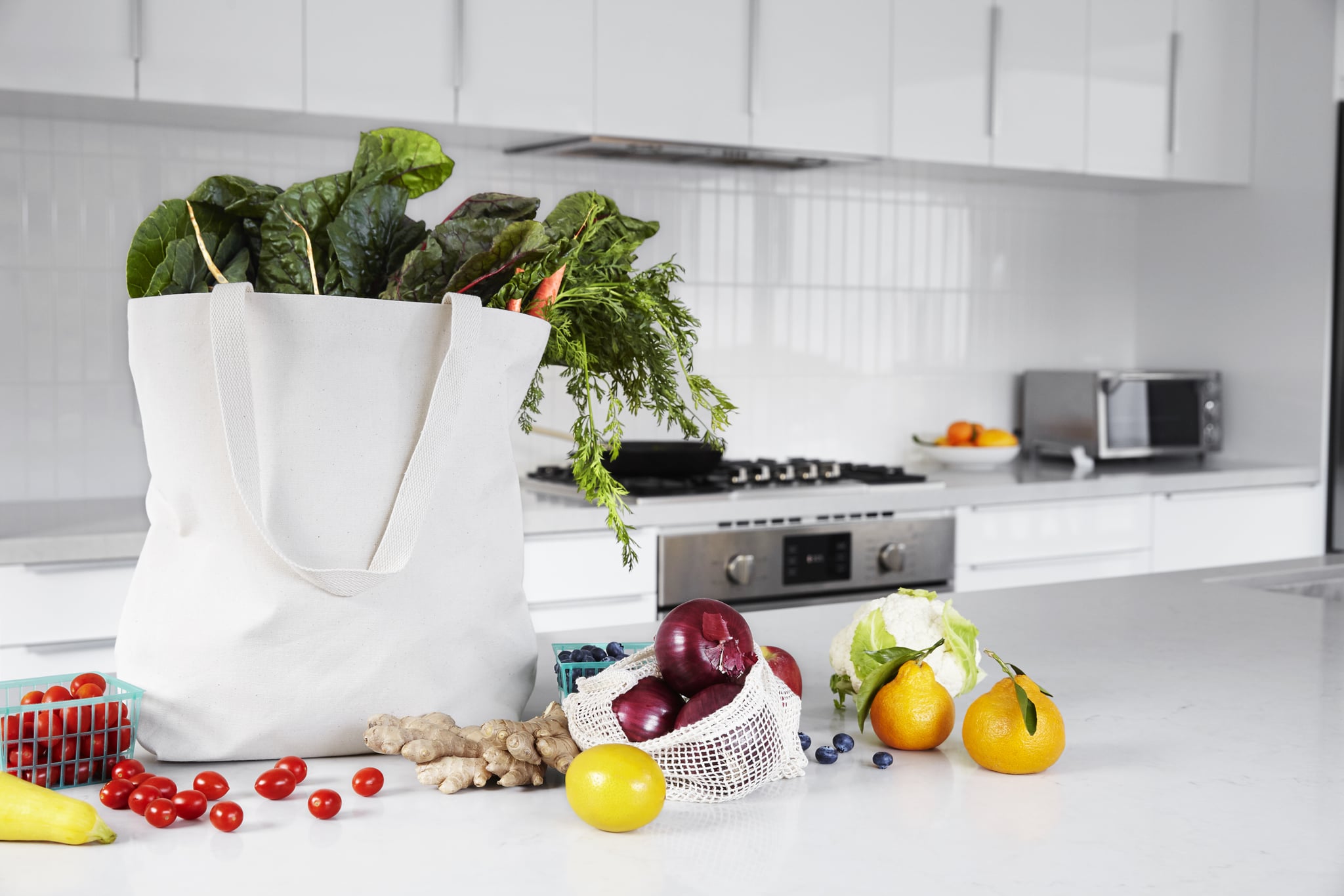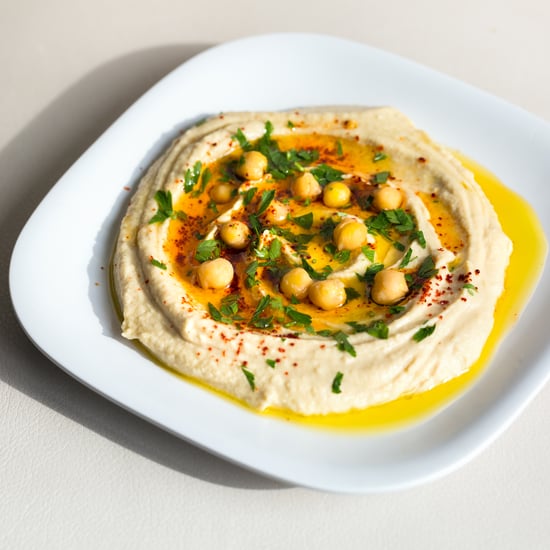What Foods Make You Bloated?
We Asked 2 Dietitians Which Foods Cause Bloating — This Is What They Said

Bloating is a really annoying yet (for most people) inevitable part of life. But if bloating and discomfort are becoming a regular occurrence, it might be time to take a peek at your diet to figure out the cause. When reading the list below, don't panic, and remember that every person's body is different. Even if you are experiencing regular episodes of bloating, it doesn't mean everything on this list is causing it. According to the dietitians we interviewed, one, some, or none of the below foods may be the culprit. The point here is merely to help you identify parts of your diet that may be causing discomfort or pain.
While frequent bloating can sometimes be a reaction to eating specific foods, it can also indicate deeper digestive issues. "Bloating can sometimes be a sign of irritable bowel syndrome (IBS), which causes symptoms like stomach cramps, bloating, diarrhoea, and constipation that are present over a period of time," says Kirsten Jackson, a London-based registered dietitian. "There's no cure, but diet changes and medicines can often help control the symptoms."
To identify certain foods that may be causing you symptoms, Rachel Clarkson, a registered dietitian in London, suggests keeping a food and symptom diary, which can be really helpful to track the time of day you're bloating (and what you ate prior). Lisa Borg, a registered dietitian at Pulse Light Clinic in London agreed, adding, "Bloating is common to several different digestive imbalances," which is why it's important, if you experience bloating regularly, to seek medical advice. All three dietitians agreed on this point, and suggest speaking to your doctor sooner rather than later, and seeking help from a registered dietitian to determine what foods are actually causing the problem.
Dairy
While not everyone is allergic to dairy, the lactose in dairy causes some people to bloat if they don't have adequate amounts of the enzyme lactase that breaks down lactose, explained Clarkson. People who are even slightly sensitive to lactose or casein (a protein commonly found in milk) will bloat easily from consuming a dairy product. According to Clarkson, there is no reason to worry about adverse effects when cutting out dairy, as long as you replace any nutrients you may be missing — for example, calcium, and vitamins B12 and D — with fortified non-dairy milk.
"Gassy Fruits"
According to Clarkson, highly fermentable fruits like dates, mangoes, figs, watermelon, apples, pears, and blackberries contain high amounts of fructose that can cause bloating in some people. Fruits that shouldn't give you any trouble include blueberries, grapes, oranges, pineapple, raspberries, strawberries, and kiwi.
Gluten
Just like with dairy, not everyone is allergic to gluten. "Bloating caused by eating gluten is different to coeliac and gluten sensitivity, which both cause inflammation," says Clarkson. "Bloating is caused by a different component than gluten, called fructan, which is also found in wheat products." Fructans are a type of highly fermentable carbohydrates that may cause bloating in some people and since gluten free products are naturally wheat free, this means they are less likely to cause bloating since they won't contain any of those bloat-causing fructans. That all said, bloating can be a good indicator that something is amiss — and you should certainly talk to your doctor.
Soy
Soy products are made from legumes that can ferment during the digestion process in your gut, which can in turn release gases and cause bloating. If you find yourself bloating often after a tofu stir-fry or a soy milk smoothie, try cutting these foods out temporarily to see if you notice a difference.
Salt
Sodium won't necessarily make you gassy, but it'll add to water retention, which can make you feel puffy and bloated as well.
Too Much Fibre
This one is a double-edged sword. Sometimes you need more fibre to relieve bloat, but too much fibre can also cause bloat. Ridiculous, right? High-fibre fruits like apples and pears contain pectin (a water-soluble fibre that is slower to digest). Pectin creates the feeling of being full for longer because of its slowed digestion, but it can also cause bloating."Soluble fibre being worked on by bacteria in the large bowel [during digestion] is often responsible for lower abdominal bloating and discomfort," says Borg. If you are eating a lot of fibre, make sure you're also drinking a lot of water, which helps your body process the fibre efficiently.
Beans
Speaking of too much fibre, beans can also cause bloating because they contain highly fermentable carbohydrates called galacto-oligosaccharides that cause excessive bloating in some people, says Clarkson. If you've ever been a bit gassy after eating chickpeas, lentils, or beans, now you know why.
"Gassy Vegetables:
A few vegetables that can commonly cause bloating in people (according to Clarkson), are asparagus, cauliflower, garlic, artichoke, leeks, mushrooms, onions, and sugar snap peas.
Not Drinking Enough Water
The fix all for all of life's ails (or so it seems). Jackson agrees that fluid is really important, not only because staying hydrated is key for keeping your bowels regular, but it's also necessary for replacing fluid if you also suffer from diarrhoea. She recommends the best drink is always going to be water, but other drinks that will not trigger symptoms are herbal teas such as green tea, ginger tea, and peppermint tea. Jackson also recommends peppermint oil capsules and the use of a hot water bottle to relax muscles if you experience severe discomfort or anti-spasmodics like Buscopan, which are also available over the counter at your local pharmacy and can be used if a doctor has diagnosed you with Irritable Bowel Syndrome.
High FODMAP Foods
The word FODMAP stands for Fermentable Oligosaccharides, Disaccharides, Monosaccharides, and Polyols, and if that sounds daunting, you're not alone. The concept is a bit of a difficult one to grasp, but it may also be the cause of your uncomfortable bloating. You may have heard of the FODMAP Diet, but it isn't actually a diet in the traditional sense. Rather, it's a highly specialised nutrition protocol that helps to identify dietary triggers of bloating and discomfort.
Common foods that are high in FODMAP (called fructans) are seemingly innocent — think onions, garlic, apples, and wheat. The great news about the FODMAP Diet, according to Jackson (and roughly 10 peer-reviewed studies), is that it has a 50-80% success rate. But to reap all the benefits, it should only be tried under the guidance of a specialist registered dietitian who has further training in FODMAPs.
As you can see, not much is left to eat if we eliminate ALL of these groups. This isn't meant to scare you into eating lettuce and lean, skinless, salt-free chicken (Please don't do that!) — rather it's to help you identify possible culprits in your diet and figure out what works best for your digestion. Take time to reflect, and in your diet and food journal, make a note of the time of day you're bloating (and what you ate prior). This will help you start to make effective changes that'll leave you feeling healthier, happier, and less distended.






